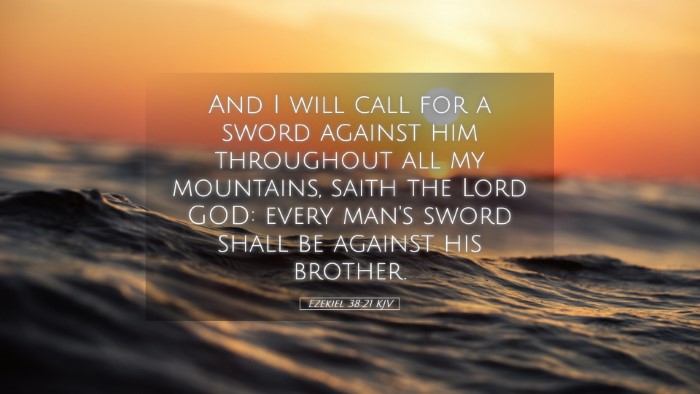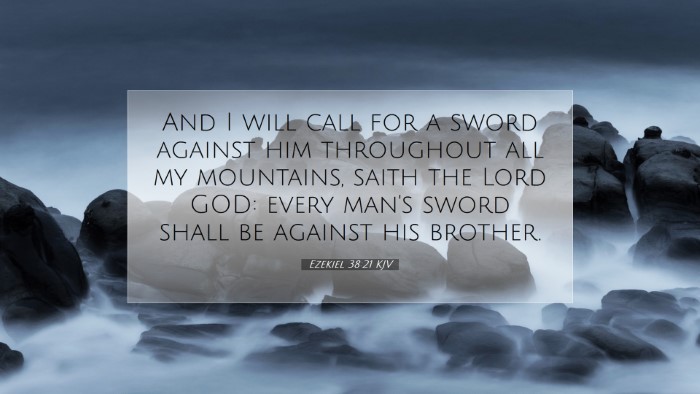Ezekiel 38:21 - Commentary and Insights
Bible Verse: "And I will call for a sword against him throughout all my mountains, saith the Lord God: every man’s sword shall be against his brother."
Introduction
The prophetic vision described in Ezekiel chapters 38 and 39 speaks of a future conflict involving Gog, the leader of Magog, who is summoned against God's people. In Ezekiel 38:21, the Lord declares a divine intervention where He will turn the swords of invaders against one another. This commentary synthesizes insights from prominent public domain commentaries, providing theological and practical implications for pastors, students, theologians, and Bible scholars.
Contextual Background
Understanding the context of Ezekiel 38:21 requires examining the overarching themes of prophetic literature. This passage is a part of a larger narrative where God works through nations, and His sovereignty is demonstrated through conflicts.
- Historical Context: Ezekiel prophesied during the Babylonian exile, addressing a disheartened Israel. The prophecy reflects God's promise to defend His people against their enemies, specifically in a future eschatological battle.
- Gog and Magog: Traditionally interpreted as a representation of the enemies of Israel, Gog symbolizes opposition to God’s purpose and people.
Verse Analysis
In Ezekiel 38:21, we find a remarkable declaration of God's power over earthly conflicts.
- Divine Intervention: The phrase "I will call for a sword" emphasizes God's active role in orchestrating events. This asserts that while nations may rise against Israel, it is ultimately God who commands the outcome.
- Nature of Conflict: The reference to swords turning on one another suggests a supernatural element whereby God causes confusion among the adversaries, a common motif in scripture (cf. Judges 7:22; 1 Samuel 14:20).
- Symbolism of Mountains: God's mountains symbolize His strength and protection. The act of calling a sword against the mountains implies that even the strongholds of the enemy will be subjected to God's will.
Theological Insights
- Sovereignty of God: This verse encapsulates a central theme of the entire Bible—the sovereignty of God over human affairs. No matter how formidable the foe, God maintains control, showcasing His supreme authority.
- Community Dynamics: The phrase "every man’s sword shall be against his brother" invites discussion on the destructive nature of conflict. It underscores the reality that internal strife often erupts within factions, leading to chaos. This serves as a warning against division and conflict among groups purportedly united.
- Prophetic Assurance: For believers, this verse provides hope. The promise of divine intervention reassures the faithful that God will ultimately defend and deliver His people from oppression.
Commentary Insights
Insights from various commentaries enhance our understanding of Ezekiel 38:21.
- Matthew Henry: Henry emphasizes that God's promise to turn the swords against each other illustrates His ability to bring disorder among the wicked. He notes the profound irony in enemies turning against themselves, revealing the futility of their plots against God's people.
- Albert Barnes: Barnes offers a historical perspective, highlighting that this prophecy foreshadows real historical battles where God’s intervention thwarted powerful enemies. He expresses the idea that this verse serves both as a warning to aggressors and consolation for the oppressed.
- Adam Clarke: Clarke draws attention to the symbolic language used within this verse. He interprets the "mountains" as representing not only physical locations but spiritual high places of opposition against God’s will, affirming that divine justice will prevail.
Practical Applications
The lessons from Ezekiel 38:21 resonate in both personal and communal contexts:
- Trust in Divine Sovereignty: Believers are encouraged to place their trust in God’s control amidst uncertainties and challenges, knowing that He is their ultimate protector.
- Call for Unity: The internal conflict highlighted in this verse serves as a reminder for the church to pursue unity and peace, reflecting Christ’s call to love one another.
- God's Assurance in Conflict: Pastors and leaders can draw from this text in assuring their congregations that in times of turmoil, God is involved, working for the good of those who love Him.
Conclusion
Ezekiel 38:21 provides profound insights into God’s sovereignty and the dynamics of conflict among nations. The assurance of divine intervention encourages believers to have faith during adversities, while the warning against internal strife calls for unity among God’s people. As we consider the various commentaries, we are reminded of the timeless truth that God is in control, wielding His authority to protect and deliver His people.


